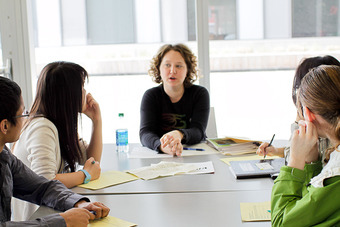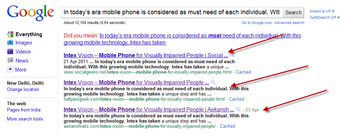2.1: Significance of Ethics in Public Speaking
2.1.1: The Importance of Studying Ethics
It is important to practice ethical behavior in your speeches, as it helps to establish trust with your audience.
Learning Objective
List the qualities of an ethical speaker
Key Points
- To speak ethically is to provide honest facts with integrity and without deception or distortion.
- Ethical speakers craft their own original content that is free from plagiarized content.
- Ethical speakers do not intentionally deceive their audiences, either by presenting falsehoods, or opinions disguised as fact; or by warping the facts to make their points.
- Ethical speakers acknowledge any conflicts of interest they may have with regard to topic, intent, venue, sponsoring organization or audience members.
Key Terms
- conflict of interest
-
A situation in which someone in a position of trust, such as a lawyer, politician, or director of a corporation, has competing professional or personal interests.
- ethics
-
The study of principles relating to right and wrong conduct.
Example
- On the NPR radio show, “On Point with Tom Ashbrook,” the host often brings in political analysts to discuss national political issues. Occasionally, his guests may disclose the fact that they work with sponsors of that radio show. By disclosing this mutually beneficial relationship between the radio show and the guest, both the show and guest demonstrate an ethical behavior.
Why Study Ethics?

Ethics
American philosopher Thomas Nagel teaching an undergraduate course in ethics at New York University.
What is Ethics?
When you think of ethics, what comes to mind? Perhaps you think of words and phrases such as ethical behavior, professional ethics, ethics boards, or code of ethics. At its heart, ethics refers to the concept of having morally acceptable values and behaviors. When you align your behaviors and actions with these values, you engage in ethical behavior.
Ethical Behavior in Public Speaking
Why would you need to even consider ethics in public speaking? First and foremost, your audience not only needs to believe in your words and message, but they need to trust you as the message giver. To engage in unethical behavior when speaking only erodes that trust.
There are other reasons to engage in ethical behavior in public speaking:
- To maintain your credibility and reputation.
- To present a fair and accurate argument of your thesis.
- To provide honest facts with integrity and without deception or distortion.
- To abide by shared or common moral values and beliefs.
To speak ethically is to use your own original speech content. If you use any substantiating facts or passages from another, you must give appropriate attribution or credit as necessary. Ethical speakers are ones who do not plagiarize their material or try to pass off words and ideas from others as their own.
Ethical speakers do not deceive their audience. It can also be stated that ethical speakers do not distort or warp facts, or worse yet, disguise opinions as fact in order to argue their thesis or make their point.
Acknowledging and responding to conflicts of interest is also regarded as ethical public speaking behavior. There may be times where you may be asked to speak on behalf of a certain topic in which you have a professional interest or may benefit from financially. In those instances, the ethical speaker will either excuse him or herself from speaking. If unable to do so, he or she may simply disclose the nature of the conflict of interest so that everyone is on the same page.
The study of ethics, then, is incredibly important to any student of public speaking, as the most effective public speakers are those who practice ethical behavior in their speeches.
2.1.2: Rules to Follow When Speaking
Effective speakers engage in ethical goals, fully prepare their speeches, practice honesty and avoid abusive language.
Learning Objective
State the basic rules of crafting and delivering a speech
Key Points
- If you recognize that you might have a conflict of interest when delivering your speech, recuse yourself or disclose to your audience the extent of the conflict.
- Respect your audience by fully preparing for your speech, from writing and editing to reviewing and rehearsing. Be thorough in your preparation.
- Don’t make your case via falsehoods or opinions disguised as facts. Come from a place of authenticity.
- Don’t intimidate your audience or opponent (if debating) by verbally attacking them or using abusive language.
- Choose either the persuasive or informative presentation style for each speech based on presentation goals and audience type.
Key Terms
- conflict of interest
-
A situation in which someone in a position of trust, such as a lawyer, insurance adjuster, or corporate executive, has competing professional or personal interests.
- ethical
-
Of or relating to the accepted principles of right and wrong, especially those of some organization or profession.
- recuse
-
to declare oneself disqualified to act.
- informative
-
An informative presentation enhances the knowledge or understanding of the material you present,be it information, concepts, or ideas. The presenter assumes the role of a teacher.
- persuasive
-
A persuasive presentation has a clear beginning, middle, and end; uses interesting supporting material; and changes or reinforce listeners’ feelings, ideas, or behavior.
Rules to Follow When Speaking

Rules for Public Speakers
Effective speakers engage in ethical goals, fully prepare their speeches and materials, practice honesty, and don’t use abusive language when speaking.
As a public speaker, it’s important to follow some basic rules as you approach the crafting and delivery of your speech. These rules include ethical goals, full preparation, honesty, and non-abusive language.
Ethical Goals
Consider why you’re speaking. Are you trying to persuade your audience to adopt a certain viewpoint or consider a new idea? If so, you’ll want to make sure that you lead your audience to that belief point in an ethical manner. You don’t want to use tactics like intimidation. Additionally, have the responsibility and professionalism to know whether or not you have a conflict of interest on a given topic or with a certain audience or venue. Recuse yourself–provide your audience with a full disclosure of said conflict of interest, and adjust your speech accordingly.
Full Preparation
Effective speakers are those who take the time to fully prepare their speeches, from the speech writing process to the delivery of the speech to the very clothes they wear for the speech. If you don’t prepare, it will show and ultimately affect your credibility as a speaker to your audience and colleagues. Respect your audience by taking thorough time to write, edit, review and rehearse your speech before presenting.
Honesty
Honesty is an extension of the ethical goals of your speech. Don’t resort to falsehoods or opinions presented as facts to make your case. Come from a place of authenticity instead of deception. Your credibility can become damaged when it is revealed you have either lied or even just slightly bent the truth in your speeches.
Non-Abusive Language
Just as one shouldn’t intimidate his or her audience, one should refrain from abusive language when speaking in public. This means attacking your audience verbally, or, in a debate-style setting, even verbally attacking your opponent. Don’t resort to name-calling or bullying; rather, make your case through the use of compelling facts and anecdotes that can be substantiated.
2.1.3: Rules to Follow When Listening
Develop a practice of active listening to be an effective listener.
Learning Objective
Discuss the qualities of an active listener
Key Points
- Presenters deserve your attention, courtesy, and open-mindedness if you are to expect the same of others once you get up to present.
- Be courteous by silencing your cell phone or other gadgets, refraining from extraneous noise, and looking at the presenter while they speak. If you’re taking notes, make sure you’re doing so in an unobtrusive way.
- Have an open mind about what material is presented to you. You may not agree, but the presenter still deserves your attention and courtesy.
Key Terms
- open-minded
-
Willing to consider new and different ideas or opinions.
- active listening
-
The process of attending carefully to what a speaker is saying, involving such techniques as accurately paraphrasing the speaker’s remarks.
Rules to Follow When Listening
You may not always be the speech presenter or speaker. Many times, you’ll be in the audience yourself. Active listening is a skill that can make you a more effective speaker in the long run.

Active Listening
The art of active listening is more than just hearing what the speaker has to say: it’s about being an engaged, attentive listener able to paraphrase what has already been said.
Courtesy
Being an active listener not only makes you a more engaged audience member but, quite simply, it’s polite. If you expect people to pay attention to your words when it’s your turn to speak, they expect the same from you. There are a number of other courteous behaviors that an active listener should practice:
- Look at the presenter.
- Do not text or chat on your phone while they speak.
- Remain quiet.
- If taking notes, either on paper or via a laptop or tablet, do so unobtrusively.
Attention
Active listening refers to the practice of not just hearing someone, but really listening and paying attention to what they have to say. Intrinsic to active listening is the ability to feed back what has been said to the speaker, often in the form of paraphrasing. As an audience member, you might not have the opportunity to actually verbalize these feedback in the moment; however, a true active listener is able to summarize at the completion of the speech.
Open-Mindedness
You may not necessarily agree with everything that is being said. It’s important to come to the presentation with an open mind—that is, to at least listen with respect and courtesy to ideas that may be in conflict with your own personal beliefs and values. Again, if you expect others to be open and receptive to your ideas, you must extend that same courtesy to others.
2.2: Plagiarism
2.2.1: Plagiarism
Plagiarism involves the taking of someone else’s words or ideas and trying to attribute them as your own.
Learning Objective
Describe the different forms of plagiarism
Key Points
- Word to the wise: just don’t plagiarize. Seriously. Don’t do it.
- Intentional plagiarism isn’t as easy to get away with as you think: institutions and companies have ways of detecting whether or not you’ve plagiarized your work, and it can have serious academic and professional repercussions if you are caught.
- If you find yourself tempted to nab a couple of lines from one of your research sources, put the full source away. Instead, rely on your own notes and paraphrasing to lessen the temptation to outright copy the work of another.
Key Term
- plagiarism
-
The act of copying another person’s ideas, text, or other creative work, and presenting it as one’s own, especially without permission.
What is Plagiarism?

Plagiarism
Plagiarism is stealing, plain and simple.
When most students think of plagiarism, they may think of outright copying another’s works. However, plagiarism can delve into murky territory that includes everything from wrongful appropriation to blatant thievery. While plagiarism may not be a crime per se, in many academic and professional contexts, plagiarism carries with it serious risks, including expulsion and/or termination from a position, organization, or company.
In its simplest form, plagiarism occurs when someone takes the words or ideas of someone else and attempts to present them as their own. Appropriating a person’s work without proper credit is what distinguishes plagiarism from mere citation or quotation. When a writer quotes or cites a person, text, image or other piece of intellectual property, the writer must give credit to where or from whom the quote or idea originated.
The “ideas” part of plagiarism can be especially tricky. Though unlikely, two completely different people may produce the exact same idea at the exact same moment. Inevitably, one person would be guilty of plagiarism. And while this does happen, the instances are few and far between.
Deliberate plagiarism should be avoided in academic and professional settings. To knowingly take the work of others and attribute it as one’s own is widely regarded as unethical, unprofessional, and illegal across most industries and organizations. Many academic and professional services can detect whether entire sections of books, articles and other works are published elsewhere, particularly on the World Wide Web. Additionally, if a writer has a unique writing style and author’s voice, it can be even easier to identify plagiarism if the content is cut and pasted into a work with a completely different tone and style.
However, unintended plagiarism is more common that one might think. Sometimes the problem stems from working too closely with source material. To avoid unintended plagiarism, writers often develop new content with the aid of notes, as opposed to whole sources such as books, articles, or web pages. Writers also craft original compositions by working off their own notes and paraphrasing.
2.2.2: Avoiding Plagiarism When Using the Internet
In the age of the Internet and social media, it can be both very easy and very tempting to plagiarize. In short: don’t.
Learning Objective
State why plagiarism can be easily detected online
Key Points
- Just because you can copy and paste a few sentences or paragraphs from an obscure Internet source doesn’t mean you should.
- Many academic institutions and even some professional organizations use online plagiarism detection software, such as CopyScape, Attributor and PlagiarismDetect.
- Just because you might thwart an online plagiarism detector doesn’t mean you don’t run the risk of being caught via manual plagiarism detection, either.
- When in doubt, avoid the temptation to plagiarize despite the seemingly endless availability of content online. Your speech is better served when your words are original and genuine.
Key Term
- plagiarism
-
The act of plagiarizing: the copying of another person’s ideas, text or other creative work, and presenting it as one’s own, especially without permission.
In Haste? Don’t Copy and Paste.
When pressed for time with a looming deadline, you might think a quick copy and paste of a few sentences here or maybe a paragraph there might be an easy solution. While it certainly is easy to Control+C, Control+V your way through a speech, it’s certainly not wise.
It might be tempting to fire up your browser and pick a relevant source buried deep within the search results. “Who looks all the way at what’s on search page 10? ” you may be thinking. Just because it’s obscure doesn’t mean it’s okay to take it and claim it as your own.
If you get caught, you could face serious academic or professional consequences. Plus—on a very plain note—it’s just not cool. It’s just bad intellectual form. In the age of the Internet, as easy as it can be to just lift something from a relevant but obscure source via Google, it’s equally as easy to get caught plagiarizing the words of others.

Avoiding Plagiarism on the Internet
As tempting as it might be to plagiarize with the vastness of available sources on the Internet – don’t do it.
Yes. Yes, You Will Get Caught.
With the advent of complex, proprietary search engine algorithms has come another niche market: plagiarism detection. If you think you can get away with just borrowing a sentence here or there, beware: sites like CopyScape and Plagiarism.org’s software can be used by academics and professionals alike, running your work through their programs to see if anything comes up with a red flag.
And if you think you can fool plagiarism detection software, don’t count out manual checking, either. You might pull a sentence or idea from an obscure professional or expert in the field, but keep in mind that your professor is an expert in this field; he or she is likely to have read whatever you’re copying.
When in doubt, avoid the temptation to plagiarize despite the seemingly endless availability of content online. Your speech is better served when your words are original and genuine.
